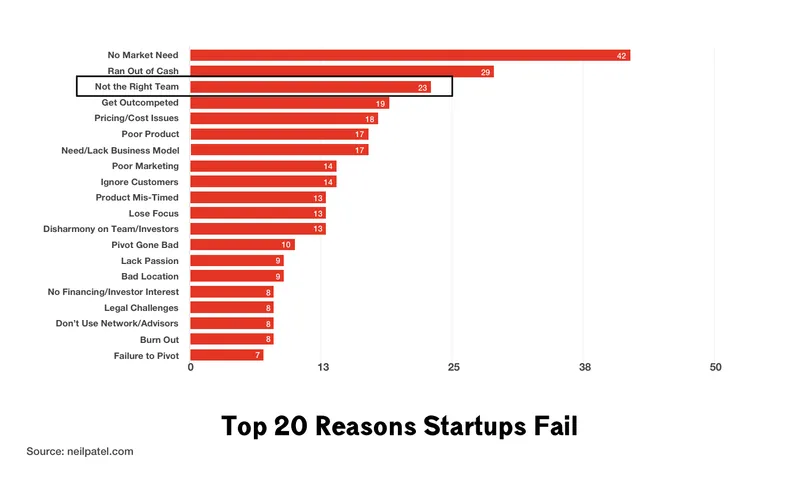Here's how you can build a winning team that will ride your startup to victory
Wondering how to go about building a team for your startup? Read everything about team building and its strategies that can benefit your company in the years to come.

No matter how brilliant your mind or strategy, if you’re playing a solo game, you’ll always lose out to a team ~ Reid Hoffman, Entrepreneur
Study says that about 60 percent of startups fail to take off due to poorly constituted teams! This statistic establishes the fact that behind every successful startup is a team of passionate individuals who work tirelessly towards a common goal. Regardless of how awesome your idea may be, building a team for your startup lays down the stepping stone to success.

Importance of team building in a startup
"Teamwork makes the dream work, but a vision becomes a nightmare when the leader has a big dream and a bad team" ~ John Maxwell, Author
According to a study conducted by the Rotman School of Management, the ability of a founder to attract a great team determines the success of the startup. While the founder’s traits are vital, it is the diversity offered by an experienced founding team that adds dimension to shape up the startup.
As such, no successful startup rests on the shoulders of an individual. It is the team that translates an entrepreneur’s dream into a reality.
The following points outline the team building benefits that every founder should know about:
Execution of the great vision
Your core team is responsible for breaking down the founder’s vision into short-term, realisable, and scalable goals. Each unit will take on separate roles and these goals will be assigned to them. The team will put together their attitude, aptitude, skill, knowledge, and competence to meet these small targets.
Collectively, you will have multiple operations taking place at the same time. On the other hand, you can focus on the larger goal and macro-level decisions. As your startup touches one milestone after the other, the startup will accelerate to success.
Defines startup culture
When it comes to team building, you are not only building a team in the workplace but you are also establishing your startup’s work culture. It is a combination of the vision, mission, beliefs, values, and the natural personality of all the individuals involved.
These qualities of the core team form the foundational beliefs of the entire startup. Even years later, these ideals will continue to permeate through the structural hierarchy of your company.
Adds complementary skills
There are multiple aspects of a business and not every founder is multi-faceted to tackle them all. Therefore when it comes to building a team for a startup, it is imperative that the gaps may be filled by an experienced team or individual. Having a perfect team that balances out all the necessary skills will synergise your collective efforts.
Support structure
The story of a startup may be a roller-coaster ride of ups and downs. Team building and leadership go hand-in-hand as you steer the ship of your startup through the uncharted seas. Your team will act as your rudder and as your anchor. Hence, building a team at work helps build your support system through this journey.
The team will keep the moral high and share the exhilaration of touching each milestone. A good team will stick by you even through unprecedented setbacks, funds crunch, or delay in product development. Since the core team shares your passion, they will always have your back. Their trust and belief in the idea that founded the startup will drive everyone to work harder towards success.
Venture capitals assess your teams
This is one of the most practical reasons to build teams. VCs decide on funding a startup on the basis of various factors, and having a solid core team is one of them. While the startup idea may be sustainable, investors know that it is subject to market conditions, which are dynamic in nature. Thus, they seek out startups backed by teams that possess the potential to adapt to the changes.
Steps to build a team for your startup

"There’s nothing wrong with staying small. You can do big things with a small team" ~ Jason Fried, Entrepreneur
By far, it has been confirmed that building effective teams have a remarkable effect on the startup. This fact just makes it all the more important to implement the best in class team building strategies to avoid complications. Each of the team building stages has to be thoroughly planned and well executed.
Keeping everything in mind, here is a list of team building steps that will guide you through the team building process:
Start with yourself
As cliche as it may sound, the beginning of a team-building approach starts with you. Be prepared to don a leader’s hat and be unafraid to make some tough decisions. As you are the head of the team, everyone will heavily rely on you.
Being the epicentre of your startup, you need to begin by analysing yourself. Since you will be playing a leadership role, you need to identify the core strengths and weaknesses that you possess. Evaluate what you bring to the table and how it will benefit your startup. Your skill set does not necessarily have to be technical in nature. In fact, in the current scenario, soft skills garner a greater weight than mere hard skills.
… And then the co-founder(s)
You may have noticed that founders and co-founders are often well-acquainted with each other. They could be friends or roommates or work colleagues, or any other informal relation. This may work really well for startups as it eliminates miscommunication due to familiarity with each other’s work ethics. Such individuals have great chemistry and can work like a well-oiled machine, which is important as there is a lot at stake.
However, successful startups stand out because of one common thing - they have complementary founders and co-founders. One could be a technical whiz while the other is a marketing expert. Each founding member should contribute something essential to the startup.
A good example of complementary founders is in the case of Intel where Gordon Moore had expertise in Chemistry while Bob Noyce was well-versed in Physics.
Identify the key positions
Once you have the top brass sorted, you need to identify the lower but significant rungs of your startup.
Normally, a startup would need the following types of team members for building the basic blocks:
- An innovator for conceptualising the idea behind any product or service
- A designer for designing and perfecting a product or a service; and
- An executor who brings the product or service to life
The principal positions in your startup could be in SEO, research and development, programming, sales and marketing, project management, and account management sectors. Identify the void and formulate a team composition. Prioritise these sections on the basis of your startup’s requirements and the corresponding budget.
Shortlist the candidates
While shortlisting the candidates, the answer to the following questions will help you determine if the candidate is worth one’s salt:
- Does the candidate possess the right set of tools for your startup?
- Will they fit in your startup’s culture?
- Are they passionate about what they do?

Such shortlisting and team building techniques will help you locate candidates that meet your specific requirements. Conduct a quick fact check and a background check on the shortlisted candidates. Once okayed, they will be ready for the next team building stage - hiring.
Hiring
After you have zeroed down on some qualifying candidates, you can proceed to the interviews. An interview will give you an insight into their attitude towards their work. You can also take this opportunity to discuss their salary expectations in the early stages of your startup. At this stage, do not be shy from being picky.
Even if you are hiring a friend, make the employment formal by extending an offer of appointment and other documentation.
When it comes to hiring for a startup, follow the mantra of “Less is more.” The team building objectives that come into play while hiring are that you have to give preference to quality over quantity.
Training
Once the individuals have been on-boarded, team building training can get them in tune with other members. Certain team building activities will focus on technical aspects while some team building activities for corporates could stress on improving interpersonal communication. On the whole, the team building workshop will help the new recruits to acclimatise to your startup environment.
Role assignment
Now that the initial stage of the team building programme is almost complete, start by assigning roles and responsibilities to the team members.

You can start by assigning small projects and increasing the complexity progressively. This is one of the most reliable team building methods to test out the pressure handling capacity and team involvement of the individuals.
Employee satisfaction
You may have worked hard towards building a winning team, but what happens next? To ensure that the team members are motivated, you need to incentivise goal achievement.
Outline promotional aspects and career growth and development opportunities to get the best from the team members.
A happy team is a necessary ingredient for your startup’s success.
Constant assessment
If you are wondering how to build an effective team, the secret is continuous assessment. Situations change and accordingly, so will the course of your startup and your requirements. Further, knowledge gaps may creep up in due time, which will have to be plugged at the earliest. Thus, assessing your team is an indispensable component of staying on top of your game.
Tips for team building

Now that you have understood the team building concepts, here are some team building tips that will steer you in the right direction:
Identify the doers from the sayers
Working at a startup can be a gruelling task. Team members are expected to keep up to pace with all the challenges. Those capable of taking meaningful action in the nick of time will naturally overcome obstacles with ease. Thus, it is important to have team members who are agile, resourceful, and quick rather than those who merely spout off facts.
Standard metrics don’t apply
If you were to choose between someone who has an impressive trailing resume and someone who buys into your vision, who would you choose? While logically, it may seem that the former is a strong contender. However, the scenario completely changes when you notice that they lack the gusto to work for your company.
When it comes to startups, it is sometimes okay to ditch the CV and focus on the individual. Candidates who are passionate and self-driven to get things done could be much more valuable than someone who may appear competent but is ineffective. It would not only prevent bad hiring but also prevent a drain on monetary resources.
Adapt, change, and improvise
The startup environment is highly dynamic and the best way for effective team management is to keep up with these trends. Knowledge, skill, and passion are the foundational stones of a team and they have to be in line with the startup’s mission and vision.

Team building for managers involves changing, adapting, and improvising the team based on the gaps and future requirements.
Focus on customer service
Presently, products and services are a lot more customer-centric than ever. With startups, the pressure increases much more to be customer-friendly. Customer satisfaction will help your startup blossom into a revenue-generating company. Thus, if you get a team that makes the customer feel like a priority and puts them first, then they are a bang for the buck.
Avoid homogeneity
Think out of the box and scout for talent over multiple channels rather than relying on conventional team building ideas. Various individuals bring their diversified personality that adds multi-layered value to your company.
Having a heterogeneous work atmosphere will provide room for creativity and individualistic ideas. Plus, they can balance and counterbalance each other’s performance and rectify the mistakes.
Exercise strong leadership
Think of a startup as a boat and your team members as rowers. If not guided, the movements will be completely haphazard. That is exactly where you, the founder, come into the picture. You take on the responsibility of a signal caller who looks forward and guides the entire team. You give direction and correct the course wherever necessary.
As understood from this analogy, it is imperative to highlight the importance of the leader to offer alignment across the teams. You are responsible for ensuring collaboration so that the task or project outcome is as expected. Quite often, you may even have to take on the role of an arbitrator for conflict resolution purposes. Hence, to ensure that your opinion and decision is valued, you have to prove yourself as a respected leader.
Hire slow, fire fast
Running a startup is not about sustaining a large employee base, but rather extracting the most out of the viable team. Therefore, rather than going on a hiring rampage, startups should take the time to build a team assiduously.
A classic team building case study for the “Hire Slow” philosophy is Airbnb, which took about five months to hire their first employee. The “Fire Fast” policy is also essential to ensure that you only have the fitting candidates in your team.
Experience vs. raw talent
The debate for experience versus raw talent against the backdrop of startups has been going on for a while now. When looking for an experienced individual, you should have a preference for those who have prior experience working at a startup or for a small business.
On the other hand, raw talent can be spotted, nurtured, and moulded to meet your business requirements. While both are important in their respective places, what every recruiter should look for is passion. The zeal for getting things done can never be compensated by experience or untapped potential.
Build a scalable team
While the purpose of this article is offering guidance on building a team for your startup, it is important to remember that startup is just a phase. Your team building skills should consider building a team for the long term when your startup flourishes into an established enterprise.
Focus on building a team of leaders who can head their respective organisational units in the future. Once you have a broader skeleton in place, team building interventions at a later stage can help you transition into larger roles.
How to establish team spirit?

"Great things in business are never done by one person "~ Steve Jobs, Business Magnate and Co-Founder of Apple
Now that you have an idea on how to build a team for your startup, it is equally important to maintain cohesiveness among them. Having a close-knit team for building team trust is one of the primary team building challenges that need to be addressed right from the start.
Having a disjointed team because of resolvable issues is an absolute waste of time, resources, and efforts. Besides, it is the last thing a founder would need when they already have so much on their plate.
To build a team spirit among your employees, you may follow the strategies outlined below:
Fun team-building activities
Startups can work on really tight schedules that can drain the energy and motivation of team members. Thus, conducting fun activities regularly can revitalise them and help in building team spirit. From official outings to at-office games - everything will nurture a team spirit.
Celebrate and reward milestones
When your startup realises short-term goals, the concerned team should be rewarded with recognition for their efforts. Acknowledging each and every member of the team and extending your appreciation to them will positively impact the team's morale.
Create team-level accountability
Pretty much like how good deeds are recognised on a team-level, the teams should also be held accountable for failure. Collective accountability of failure will cut down on the finger pointing and blame game.
Build reflection points on achieving goals
Teams need to draw inspiration from their positive experiences and learn from the negative ones. Thus, setting up reflection points after achieving goals will allow the team to pause and figure out how they could have done things better. It also allows the team to feel accomplished.
Erase hierarchical boundaries for communication
Miscommunication between the team members is one of the primary reasons why teams fail to perform. Quite often, such instances of miscommunication arise due to hierarchical differences. Further, the feeling of being unheard and unappreciated within the team causes general dissatisfaction and resentment and affects the overall working of the team.
Do not lose the sight

Even the biggest and most well-established companies face issues while building a team. Problems could arise due to conflicting visions, hierarchial imbalances, and personality clashes. In case of startups, these issues are compounded due to the apprehension that a single bad hiring could spell doom for the entire startup.
Building a team for a startup requires a great level of commitment, honesty, and formation of an intense relationship from both ends. Since the startup is on the lookout for a candidate that carries niche expertise, it is perfectly fine to take a while and hire at your own pace. Identifying the knowledge gaps and filling them out periodically is also vital to keep the machinery running. However, do bear in mind to find complementary teammates to balance out each other.
Another key takeaway would be that startups should not feel shy to fire an individual who is unable to contribute to the company. Of course, the firing should take place as humanely as possible but it should take place despite everything.
In conclusion, this African proverb sums it up beautifully:
If you want to go fast, go alone; if you want to go far, go together.
Thus, to take your startup to stellar heights, you need to start by building a winning team that will take you far.
(Edited by Megha Reddy)





